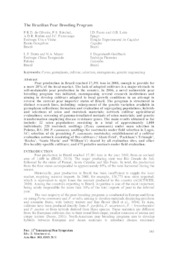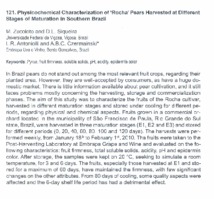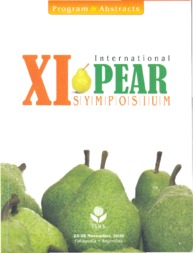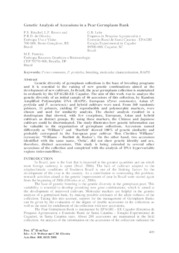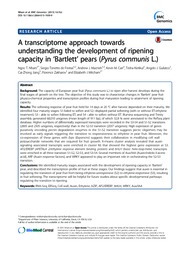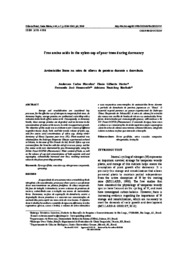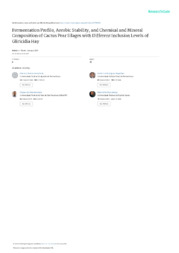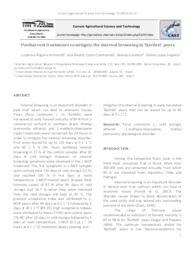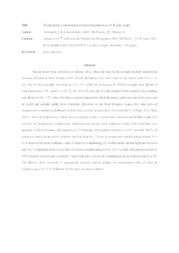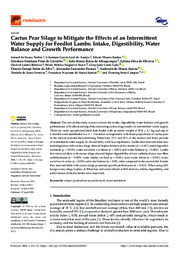Search Publications
Filter by:
| Author(s): OLIVEIRA, P. R. D. de; RITSCHEL, P. S.; RUFATO, A. de R.; FIORAVANÇO, J. C.; QUECINI, V. M.; FAORO, I. D.; LEITE, G. B.; DUTRA, L. F.; MAYER, N. A. Pear production in Brazil reached 17,391 tons in 2008, enough to provide for a mere 20% of the local market. The lack of adapted cultivars is a major obstacle to self-sustainable pear production in th... ... |
| Author(s): ZUCOLOTO, M.; SIQUEIRA, D. L.; ANTONIOLLI, L. R.; CZERMAINSKI, A. B. C. In Brazil pears do not stand out among the most relevant fruit crops, regarding their planted area. However, they are well-accepted by consumers, as have a huge domestic market. |
| Author(s): ZUCOLOTO, M.; SIQUEIRA, D. L.; ANTONIOLLI, L. R.; CZERMAINSKI, A. B. C. he quality of fruits is a condition to satisfy the consumers. Consumer satisfaction is attained when the harvesting, storage and retail periods are adequately performed. |
| Author(s): RITSCHEL, P. S.; REVERS, L. F.; LEITE, G. B.; FERREIRA, M. E.; OLIVEIRA, P. R. D. de
|
| Author(s): NHAM, N. T.; FREITAS, S. T. de; MACNISH, A. J.; CARR, K. M.; KIETIKUL, T.; GUILATCO, A. J.; JIANG, C.-Z.; ZAKHAROV, F.; MITCHAM, E. J. The capacity of European pear fruit (Pyrus communis L.) to ripen after harvest develops during the final stages of growth on the tree. The objective of this study was to characterize changes in Bartle... ... |
| Author(s): MARAFON, A. C.; HERTER, F. G.; HAWERROTH, F. J.; BIERHALS, A. N.
|
| Author(s): SÁ, M. K. N. de; ANDRADE, A. P. de; ARAUJO, G. G. L. de; MAGALHÃES, A. L. R.; ARAÚJO, C. de A.; VALENÇA, R. de L.; MACEDO, A. de; OLIVEIRA, A. R. da S.; ZANINE, A. de M.; FERREIRA, D. de J.; NEGRÃO, F. de M.; SILVA, T. G. F. da; CAMPOS, F. S.; GOIS, G. C. Cactus pear is used in large proportions in diets for small ruminants in semiarid regions. However, its exclusive use is not recommended due to the low fiber and crude protein content and the high wat... ... |
| Author(s): ANTONIOLLI, L. R.; CZERMAINSKI, A. B. C.; ZUCOLOTO, M.; SIQUEIRA, D. L. Internal browning is an important disorder in pear fruit which can lead to economic losses. Pears (Pyrus communis L. cv. Bartlett) were harvested at early harvest maturity of 90 N from a commercial or... ... |
| Author(s): ANTONIOLLI, L. R.; CZERMAINSKI, A. B. C.; HOFFMANN, J. F.; MARCO, D. 'Rocha' pears were harvested in January 2012, when the fruit in the orchard reached commercial maturity, defined by flesh firmness of 67 N and prevalence of 6 and 7 rates in the starch scale (from 1 t... ... |
| Author(s): NOBRE, I. de S.; ARAUJO, G. G. L. de; SANTOS, E. M.; CARVALHO, G. G. P. de; ALBUQUERQUE, I. R. R. de; OLIVEIRA, J. S. de; RIBEIRO, O. L.; TURCO, S. H. N.; GOIS, G. C.; SILVA, T. G. F. da; PERAZZO, A. F.; ZANINE, A. de M.; FERREIRA, D. de J.; SANTOS, F. N. de S.; CAMPOS, F. S. The aim of this study was to evaluate the intake, digestibility, water balance and growth performance of lambs receiving diets containing cactus silage under an intermittent water supply. Thirty-six m... ... |
Observation
Some of Embrapa's publications are published as ePub files. To read them, use or download one of the following free software options to your computer or mobile device. Android: Google Play Books; IOS: iBooks; Windows and Linux: Calibre.
Access other publications
Access the Agricultural Research Database (BDPA) to consult Embrapa's full library collection and records.
Visit Embrapa Bookstore to purchase books and other publications sold by Embrapa.

